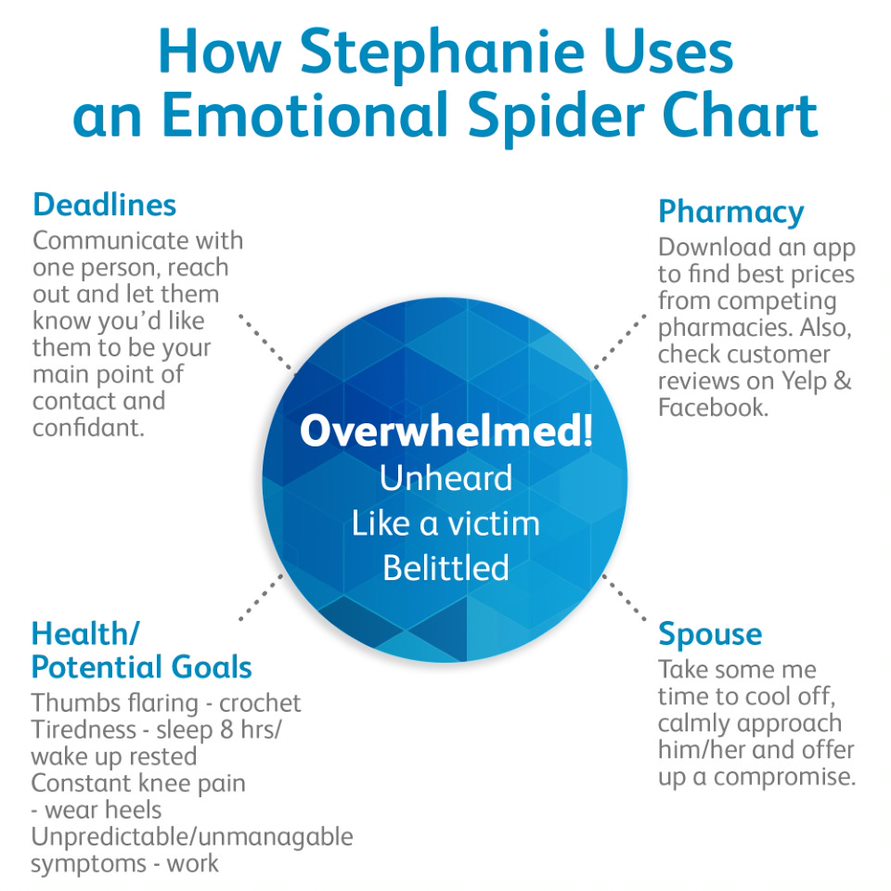How to Practice Self-Care

We’re dedicated to sharing the perspectives of people affected by chronic inflammatory conditions like rheumatoid arthritis (RA). That’s why we created Arthritis.com, a place where people living with RA can find inspiration, lifestyle advice, tools and disease information. Following is an article from Arthritis.com contributor Stephanie Aleite, who is living with RA. Pfizer asked Stephanie to share her story and she was compensated for this article.
For me, stress and my rheumatoid arthritis (RA) seem to go hand-in-hand. I like to think that I manage stress well, but the truth is, some things (and some people) have the ability to get under my skin no matter how zen I am.
Other times, the way I handle stress ends up causing me even more grief than the original stressor. For example, one time I drove 25 minutes to the pharmacy only to discover my prescriptions had not been refilled. Instead of handling it calmly, I sped home in a huff without my medication.
Sometimes, in the moment, I seem to forget all my self-care techniques and actually end up making myself more stressed by avoiding the problem causing my stress in the first place!
I 100% believe in massages, manicures/pedicures, yoga* and active relaxation. Yet, when I’m in panic mode, there’s no way I’m going to be able to sit down at a nail salon and spend $30 peacefully. I need to relax while taking action.
So, I decided I needed to get serious about self-care to better manage my stress and symptoms during an RA flare. Here’s what I do now:
Step 1: Deep breath - what am I feeling?
I take some time to think about everything I’m feeling, then I write down my primary emotion in BIG letters and circle it (below is an example from my pharmacy fiasco). Sometimes, I like to add three or four exclamation points and underline the word for emphasis. If I’m feeling a lot of emotions, I’ll write down the main one, and then write down all of my little emotions below the line.
Step 2: What situations are [insert emotion]-ing me?
Next, I draw out arms (creating a spider) and quickly write one word that defines the situations that have me overwhelmed. *Hint: Don’t write out a synopsis of the stress-triggering event. That may cause you to relive the event and stir more turmoil. Remember, we’re trying to de-stress!
Step 3: Helping to manage stress Are there ways to help improve stress?
If yes, what’s my plan? If no, how can I de-stress in a healthy way?
This step isn’t supposed to be done quickly. Rather, I like to take my time in a quiet place pondering each stressor individually instead of all at once, since that can overwhelm me again. Below are some problems and solutions I’ve identified based on past personal experiences:
Spouse and Health: When my husband and I have a tiny squabble over household chores, it might be easy to bite his head off and claim victory. Instead, I vent to my closest girlfriend first. She graciously lets me unload about how much it drives me up a wall when my husband leaves his dirty dishes in the sink overnight. That approach allows me to gently confront him later about the issue. So, I write down that taking time to cool off before I speak to my husband about a problem works for both of us. BTW, he apologized profusely, even offering to help me clean our apartment!
Work Deadlines: For me, it is very difficult to communicate my shortcomings, and even more so, my needs. My approach is to latch on to someone in the company I trust, and quietly let them know what’s going on (the good and bad!).
Health: I write up a list of the RA symptoms that are most troubling me. Second, I write up a list of activities I want to be able to do if these symptoms can be managed. I’ll then proactively take these lists to my doctor to help set realistic goals and work together on an individualized treatment plan that works for me.
Pharmacy: This is a really annoying problem. Especially when my knees are hurting, and I have to stand in line for 15 minutes only to find out my prescription never got there. The advice may seem simple: Call first! At this point, my pharmacy is way too far from my home. I need to go someplace where I can stop in quickly to pick up my medications. I also need to let my doctor know at my next visit that I would like to change to another pharmacy closer to home if possible.
The truth is, not every problem can be solved easily. My health, for instance, is an issue I’m going to have to deal with for the rest of my life and though it’s not ideal, it is manageable if I learn how to take charge and be the best advocate I can be for myself.
Sign up for more tips and information on Arthritis.com here.
Images appearing on this page are actor portrayals.
*Be sure to check with your healthcare professional to see if these physical activities are right for you.






